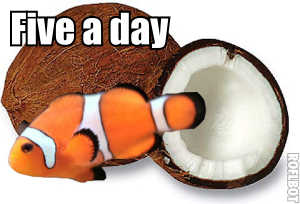1950s-style casual racism never ceases to amaze me.
The other day I was listening to my playlist of UK number 1 hits. Being of a rather anorak-y bent, I have mp3s of every song to hit the top of the UK charts since they were instigated by NME in 1952. The track that I was particularly struck by was "She Wears Red Feathers" by Guy Mitchell.
For those of you not familiar with this song, it tells a very straighforward tale. English bloke, works at a bank in London, has a boring life. He escapes by watching the touring travelogues at the local Music Hall, and on one such evening falls for one of the "native girls" performing on stage. So he ups sticks, joins the navy, sails to the island she lives on and marries her, finally returning to London to resume his banking career with new wife in tow.
On the face of it, nothing wrong with that. Indeed, I couldn't imagine the same song reaching the number 1 spot in the USA considering its central theme is an interracial marriage - groundbreaking for the mid-1950s, and certainly something to be applauded.
But listen to the song (do a Google search or something, you'll find a copy somewhere), and all hope evaporates. Let's first examine the chorus:
She wears red feathers and a huly-huly skirt.
She wears red feathers and a huly-huly skirt.
She lives on just coconuts and fish from the sea.
A rose in her hair, a gleam in her eye and love in her heart for me.
 Hmmm. The use of pidgin English for "hula skirt" is never a good sign, as is the fact the Mitchell pronounces coconut as "cokey-nut" just to hammer the message home. (Mitchell - real name Albert Cernak - was a Croatian-American, despite referring to himself as a "son of an Englishman" in the song.)
Hmmm. The use of pidgin English for "hula skirt" is never a good sign, as is the fact the Mitchell pronounces coconut as "cokey-nut" just to hammer the message home. (Mitchell - real name Albert Cernak - was a Croatian-American, despite referring to himself as a "son of an Englishman" in the song.)
Mind you, there's nothing wrong with the first couple of verses - one about how he first clapped eyes on his future spouse, and one about how he travelled to her home to meet up with her. The only reference to her ethnicity is in the fact that she's described as a "native girl" in the opening verse - a twee '50s term, because surely everyone is a native of somewhere. Still, any goodwill that these opening verses might have build up is completely lost once we get to verse three and everything goes to shit:
I went to her ma and pa
And said I loved her only.
And they both said we could be wed
Oh! What a ceremony.
Seems okay so far. But what's this coming up in the next four lines...
An elephant bought her in,
Placed her by my side
While six baboons got out bassoons
And played "Here Comes The Bride".
Jesus Skateboarding Christ, I don't know where to begin with that. Where the fuck is this girl meant to live!? Where can I find an island that has both elephants and baboons as indiginous species? Why do we have it drummed home in the chorus that the place is so "backward" that they only eat fish and coconuts, but they still know what a bassoon is, and are conversant enough with the works of Richard Wagner to have heard of the "Bridal Chorus" from his opera Lohengrin. Heh, look at those funny natives, carried around by elephants and entertained by woodwind-playing primates.
The song can surely only get better from here, can't it? Oh dear...
I'm back here in London town
And though it may sound silly
She's here with me, and you should see
Us walk down Picadilly.
The boys from the London Bank
Kinda hold their breath.
She sits with me and sips her tea
Which tickles them to death.
What in the name of cock is that all about? It's delieverd by Mitchell with a knowing chuckle, but the humour seems to have gotten lost in the 55 years since the song was written. How else am I meant to read this except:
"My colleagues were amazed that I had the nerve to return home with my 'native' bride. It sounds ridiculous, but we often walk down the street together! And when she drinks tea, of all things, my colleagues think it is the single most hilarious thing they have ever witnessed."
Of course, when this song made it to the top of the UK charts, no-one batted an eyelid. I'm sure it means well, but listening to it again in 2008 makes me feel slightly uncomfortable. I think I'll have to have some halibut and coconut chowder to recover...


No comments:
Post a Comment